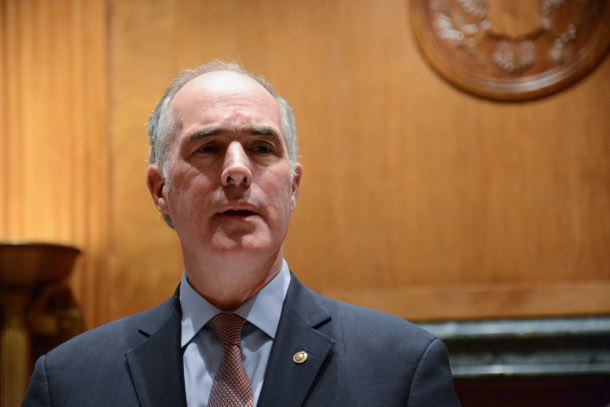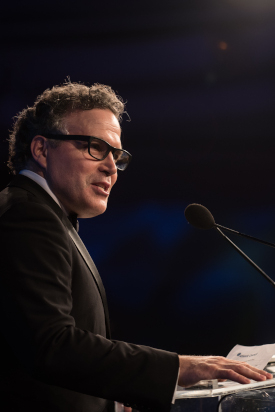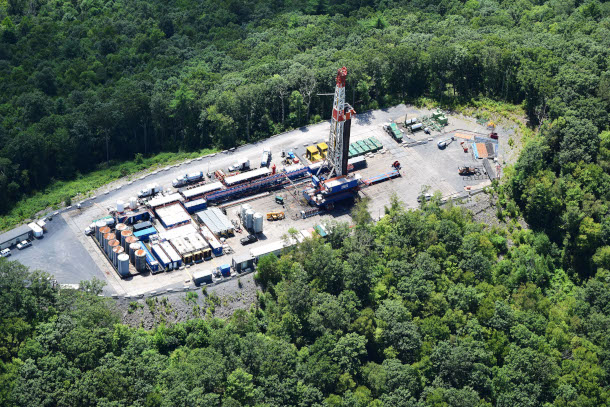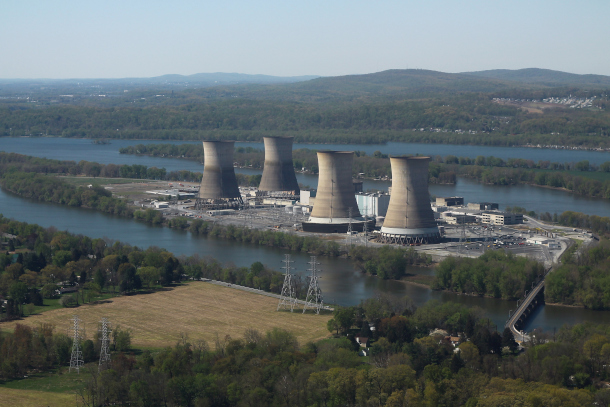Climate and the PA Senate Race
Air Date: Week of October 18, 2024

Pennsylvania’s Democratic Senator Bob Casey has served three terms so far and is up for reelection this fall. (Photo: AFGE, Flickr, CC BY 2.0)
As control of the US Senate hangs in the balance, the Pennsylvania race between Democratic incumbent Senator Bob Casey and his Republican challenger Dave McCormick is heating up. Inside Climate News reporter Kiley Bense joins Host Jenni Doering to explain the climate and environment dimensions of Pennsylvania’s Senate race.
Transcript
O’NEILL: From PRX and the Jennifer and Ted Stanley Studios at the University of Massachusetts, Boston, this is Living on Earth. I’m Aynsley O’Neill.
DOERING: And I’m Jenni Doering. As control of the US Senate hangs in the balance, the race for a seat in Pennsylvania is heating up. Democratic incumbent Bob Casey faces Republican challenger Dave McCormick, and the race appears close enough to go either way. Here to explain the climate and environment dimensions of the Pennsylvania Senate race is Kiley Bense. She’s a Philadelphia-based reporter for our media partner, Inside Climate News. Welcome to Living on Earth, Kiley!
BENSE: Thank you so much for having me.
DOERING: So give us a sense please of who these two candidates are. Where do they stand on climate and the environment? Let's start with the incumbent, Democratic Senator Bob Casey.
BENSE: So Bob Casey is a three time incumbent. This would be his fourth term in office as a Senator, and he has become more climate conscious in recent years. He's a big supporter of the Inflation Reduction Act, which was passed under the Biden administration, and he's been really vocal about investing in clean energy technologies and using that as a way to combat climate change. Dave McCormick, who is the Republican challenger, he has a more complicated record on climate. So I think overall, he's trying to walk a kind of middle ground, a tightrope line, I guess. You know, in order to win Pennsylvania, because it's a purple state, he needs to win over moderate, middle of the road, swing voters. And so he is one of those few Republican candidates who acknowledges that climate change is real and that it's happening. If you read his energy policy platform, he says that we need to tackle climate adaptations. We need to think about ways to adapt to a changing climate. But then, on the other hand, he says a lot about how we need to do more fracking, how we need to roll back regulations, how we need to do, increase oil and gas production in the state.
DOERING: And so what's the record for Democratic Senator Bob Casey when it comes to fossil fuels and fracking in particular, which is huge in Pennsylvania?

Republican Dave McCormick is challenging Bob Casey in the race. (Photo: Chairman of the Joint Chiefs of Staff, Flickr, CC BY 2.0)
BENSE: So this has been a huge point of contention during this race in particular. Dave McCormick has really sought to tie Bob Casey to Vice President Kamala Harris's past comments about fracking, but the truth is that Bob Casey has always been supportive of fracking. He says, if you read his platform, he'll say that he's for what he calls responsible fracking. But that does not mean that he is against natural gas development at all.
DOERING: And how does he define responsible fracking?
BENSE: Basically, he's saying that we should keep fracking as long as it's done safely and it's regulated. And I think that if you were to ask environmentalists or people in Pennsylvania who really work on these issues on the ground, they would say that it is not being done safely and not being regulated enough.
DOERING: So to what extent has Bob Casey supported any legislation that would try to regulate and make fracking more responsible?
BENSE: So he did co sponsor a bill called the FRAC Act, which Dave McCormick has brought up a couple times as a way to attack Casey. You know, McCormick has said that Casey is against fracking, or he's in line with Harris, and that he would ban it. There's no evidence for that, but it is true that he did co sponsor this bill, which, among other things, would have made it a requirement for companies to disclose the chemicals they use when they're fracking. That bill never went anywhere. I don't believe it ever came to a vote.
DOERING: Now 18 years is a long time to be in office. To what extent have Senator Casey's views on climate change shifted over that period?

While fracking remains a buzzword in national politics, other issues like abortion and inflation are higher priorities for many Pennsylvania voters. (Photo: FracTracker Alliance, Flickr, CC BY 2.0)
BENSE: I think that he's always been relatively pro environment in terms of how he's voted, but in the last few years, he's become more vocal about his support for climate change measures. The League of Conservation Voters gives him a 94% score on his environmental record, and that's fairly consistent across his three terms. I think that he's maybe been talking about these issues more in the last few years. You have to keep in mind, because the oil and gas industry is quite powerful in Pennsylvania, for our statewide politicians, there's a lot of political calculus that happens when they talk about oil and gas and when they talk about climate change.
DOERING: How much do you think that climate change as an issue has been on Pennsylvania voters' minds in recent years?
BENSE: So I think unfortunately, for people who care a lot about this issue, in terms of how Pennsylvania voters rank climate change, it's pretty low. A lot of other issues come first, so things like jobs, inflation, reproductive rights and abortion, border security and immigration, these are all things that are coming before climate change and also before fracking and energy issues as well. I think for a lot of Pennsylvanians, that national conversation where fracking is such a buzzword and people equate winning Pennsylvania with having a certain position on fracking is really frustrating. If you look at polling on fracking, Pennsylvanians are very divided. There's no consensus. There's a lot of ambivalence. And this is one of the reasons that it's not the type of issue that if you go all in on fracking, you're going to win Pennsylvania, because especially in the parts of the state where there's not fracking happening, like here in Philadelphia in southeastern Pennsylvania, which is where a lot of the population lives, it's not something people are talking about, and especially when they're thinking about who they're going to choose to vote for, it's not an issue like, say, abortion that is going to sway you to one candidate or another.
DOERING: We've reported in this election season about how much young voters especially care about climate change. How does that factor into the Pennsylvania Senate race and you know, concerns about young voters turning out for these candidates?
BENSE: So as this race has become tighter and more competitive, it becomes more important for someone like Casey to appeal to parts of the Democratic constituency that maybe in the past, he could have taken for granted, or maybe weren't as important to his victory. And young voters in this election are a key part of that. Young voters in Pennsylvania, like in other parts of the United States, tend to care a lot more about climate change. They care more about figuring out what we're doing about things like fracking, and they are kind of looking at Casey's record and wondering what he might be like if he's reelected, and whether he it may be possible that he might take an even stronger stance on climate issues.

At their first debate, both Casey and McCormick spoke positively about the reopening of the Three Mile Island nuclear plant. (Photo: formulaone, Flickr, CC BY SA 2.0)
DOERING: And are we seeing any pressure from those young voters on Casey to promise more when it comes to climate and fracking?
BENSE: There's certainly pressure from environmental groups and from young voters in the state who would like to see Casey take a stronger stance on climate. They would really like him to take a stronger stance on things like fracking, on fossil fuel extraction, on liquid natural gas exports. He has kind of tried, as many politicians in Pennsylvania do to walk this middle line, and for environmentalists, they feel like that's not enough.
DOERING: You know, just recently, we reported on the proposed reopening of Three Mile Island to help power Microsoft's huge AI, artificial intelligence computing energy needs. To what extent have these candidates reflected at all on Three Mile Island reopening specifically and on nuclear power more broadly?
BENSE: The candidates were actually asked about this specifically during their debate on October 3, and it was one of the few areas where they seemed to somewhat agree. They both said that they were for reopening Three Mile Island, that they were pro nuclear power. I think Senator Bob Casey views nuclear power as part of a way that we are going to be able to transition to clean energy in the future. And then for Dave McCormick, he has really talked a lot about making Pennsylvania energy dominant again, and he likely views nuclear power as part of a portfolio to make that possible.

Kiley Bense is a Philadelphia-based reporter for Inside Climate News. (Photo: Brendan Bense)
DOERING: Now these candidates have both positioned themselves as for all of the above energy strategies. So to what extent has renewables, like wind and solar, how important have those been in Pennsylvania?
BENSE: This is an under talked about issue. So I did a story about this, kind of laying out questions that I wish the moderators would ask in the debate about energy and climate, and one of the questions that I would love to ask them both is what they would do to help position Pennsylvania better in terms of renewable and clean energy. There's been an influx of investment that's related to the Inflation Reduction Act and other legislation that was passed under the Biden administration, that was kind of earmarked for jump starting domestic production of clean energy in places like Pennsylvania and across the United States. But Pennsylvania is very far behind when it comes to clean energy investment, so we have a long way to go to catch up to other states. And I think part of the reason for this lag is because of our divided politics, it makes it harder for the legislature to agree on things and pass bills and make progress on issues like this. And even in Republican controlled states that tend to be very pro fossil fuel, they are making a lot more gains in clean energy than we are. I am the Pennsylvania reporter for Inside Climate News, so I care a lot about Pennsylvania, but I do think that what happens in Pennsylvania is really important, far beyond the borders of our state, in part because it's such a microcosm for the country. So the reasons that make Pennsylvania a swing state, it's very politically diverse and divided, it's also a big fossil fuel producer. And so if the United States, I think, is actually going to make progress on climate change and on transitioning to clean energy, states like Pennsylvania need to be part of that charge. And I think until we start to see real change in a state like Pennsylvania, we're not going to have real change at the national level either.
DOERING: Kiley Bense is a reporter with our media partner Inside Climate News, based in Philadelphia, Pennsylvania. Thank you so much, Kiley.
BENSE: Thank you.
Links
Inside Climate News | “Fact Checking the Pennsylvania Senate Debate Claims on Energy”
Inside Climate News | “Polling Shows Pennsylvania Voters are Divided on Fracking”
Living on Earth wants to hear from you!
Living on Earth
62 Calef Highway, Suite 212
Lee, NH 03861
Telephone: 617-287-4121
E-mail: comments@loe.org
Newsletter [Click here]
Donate to Living on Earth!
Living on Earth is an independent media program and relies entirely on contributions from listeners and institutions supporting public service. Please donate now to preserve an independent environmental voice.
NewsletterLiving on Earth offers a weekly delivery of the show's rundown to your mailbox. Sign up for our newsletter today!
 Sailors For The Sea: Be the change you want to sea.
Sailors For The Sea: Be the change you want to sea.
 The Grantham Foundation for the Protection of the Environment: Committed to protecting and improving the health of the global environment.
The Grantham Foundation for the Protection of the Environment: Committed to protecting and improving the health of the global environment.
 Contribute to Living on Earth and receive, as our gift to you, an archival print of one of Mark Seth Lender's extraordinary wildlife photographs. Follow the link to see Mark's current collection of photographs.
Contribute to Living on Earth and receive, as our gift to you, an archival print of one of Mark Seth Lender's extraordinary wildlife photographs. Follow the link to see Mark's current collection of photographs.
 Buy a signed copy of Mark Seth Lender's book Smeagull the Seagull & support Living on Earth
Buy a signed copy of Mark Seth Lender's book Smeagull the Seagull & support Living on Earth

